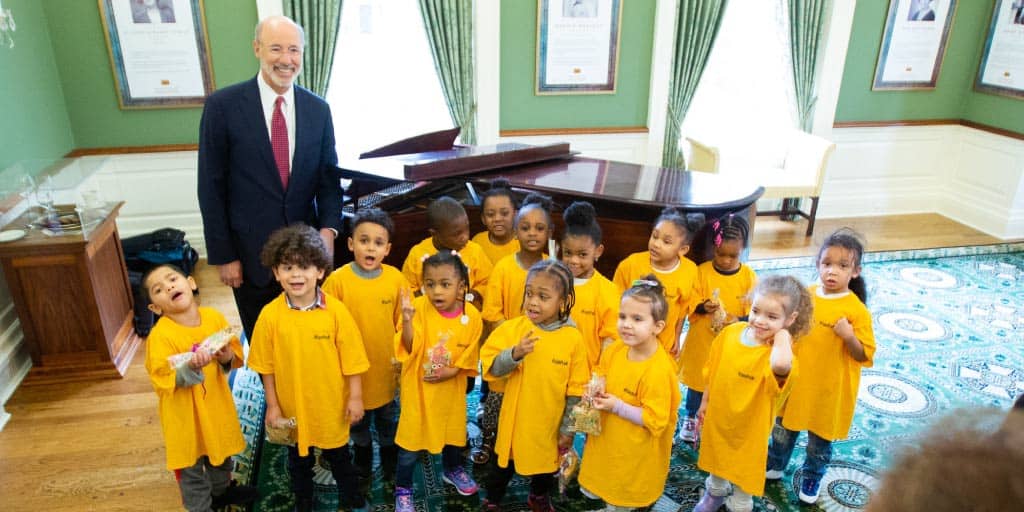Harrisburg, PA – Funding for pre-k to 12 education has increased by $1.2 billion and early education assistance has doubled since Governor Wolf took office. Today, the governor was joined by preschool children and Pre-K for PA to celebrate Pennsylvania’s historic education investments, including this year’s $265 million funding increase for pre-k to 12 education.
“Five years ago, schools were struggling with teacher layoffs, larger class sizes, and cuts to educational programs,” said Gov. Wolf. “Our children and their futures are my top priority and this year we will invest $1.2 billion more into classrooms than we did five years ago. That means teachers can focus on educating, students can focus on their learning, and Pennsylvania is on a path that values knowledge, skill, and innovation. There is no better investment Pennsylvania can make than ensuring our children get a quality education as they grow.”
Early Education The governor secured a $30 million increase for early education in this budget, creating approximately 2,200 new slots in Pennsylvania Pre-K Counts and 465 new slots in the Head Start Supplemental Assistance Program. The budget also includes an increase of $15 million for preschool Early Intervention services
Since the governor took office in 2015, funding for high-quality pre-k has increased by $145 million annually, more than doubling, to serve an additional 13,500 children.
“Investing in high-quality pre-k for thousands of our youngest children is an investment in Pennsylvania’s future,” said Gov. Wolf. “Early education is proven to help kids prepare for kindergarten, laying the groundwork to succeed in the classroom for years to come.”
“Governor Wolf understands the irrefutable value of investing in high quality pre-k and he continues to push for expanded access to children across the Commonwealth,” said Kari King, President and CEO, Pennsylvania Partnerships for Children, Pre-K for PA Principal Partner. “We all know that there is more work to be done, but today is another milestone as we chip away at the number of children who miss out on this once-in-a-lifetime learning opportunity. Pre-K for PA and our tens of thousands of supporters applaud Governor Wolf and the legislature for maintaining the political will to continue to invest in greater access to high quality pre-k again this year.”
“Today’s budget is a historically important milestone for the Commission as it represents a doubling of investment in early childhood education since Governor Wolf took office,” said Dr. Tom Foley, Commissioner, Pennsylvania Early Learning Investment Commission. “These investments will improve life outcomes for children today and strengthen Pennsylvania’s workforce and economy both now and in the future.”
In addition to early education funding, the budget allocates $15 million in federal funds so nearly 1,000 infants and toddlers on waiting lists can get quality child care.
Basic Education This year’s budget increases basic education spending by $160 million to improve education opportunities for every student in the state, regardless of zip code. The funding formula the governor signed into law in 2015 will be used to distribute the funding more fairly to school districts that need it most. Special education will increase by $50 million, building on the $90 million increase of the past four years.
Higher Education The budget increases funding by 2 percent for higher education, including additional investments in Pennsylvania’s community colleges, the Pennsylvania State System of Higher Education, and the state-related universities. The Thaddeus Stevens College of Technology, Lancaster, will also receive an additional $4 million to assist with furthering its goal of providing high-quality, affordable technical education. Over the last five years, funding for higher education has increased by $188 million.
Updating the Start, Dropout Ages The budget includes the governor’s proposal to raise the school dropout age from 17 to 18 and lower the required age to start school from 8 to 6. The state Board of Education had unanimously supported both changes.
Pennsylvania was just one of two states that allows children to wait until age 8 to enroll in school. The age requirement was set in 1895 and was badly outdated. Today, students need much more robust education and the state law should change to reflect the times.
The previous dropout age was set at 17 in 1949. Over the last 70 years the economy has changed, and the education and skills people need have shifted dramatically. Approximately 4,400 Pennsylvania students drop out of school before turning 18. Today, people increasingly need a high school diploma to go to college or start a job-training program necessary to get good, middle class jobs that provide economic security for themselves, their families and our economy.


